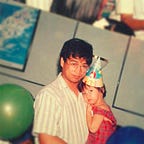Lessons learned as a social science researcher turned data science fellow
Luck — that’s how I ever came across the application for a spot in the Eskwelabs fellowship. After the application, exams, essay, and interview, I was given one of the 25 spots in the first cohort of their Data Science Fellowship. Timing is one thing, but getting through the program is another. At that time, I was juggling a full time job and had to travel two hours from Los Baños just to get to class six times a week. It was nothing short of patience (and maybe miracle) that I finished the program — nothing like passion to give you energy after coming home at midnight from a class, then getting up for an 8–5 job.
So, what’s the take away?
Get it done, even if it’s not yet perfect
As an academic for four years, I had the luxury of time to think about things. That’s the reason I worked in research, after all. I am terrible at time-pressure activities — I like planning and thinking about every possible scenario before doing it. For six long weeks on Saturday hackathons, we had to derive insights from a very messy data set, propose solutions, and create a captivating presentation in four hours. It took me a while to adjust to such sprints.
A hard hitting reality for an academic: getting it done first, even if it’s not perfect. My early career has been littered with ideas I have not pursued yet due to lack of confidence in my skills (and not to mention, good old academic procrastination), or ideas I have pursued (and still pursuing) in very slow leisurely pace. Hackathons helped me to strategize what can be done in such a short time, prioritize tasks that will generate insights with impact, and to look for the light at the end of the tunnel (by that, I mean have a directed exploration, not a meandering one).
If it’s not done, there is nothing to improve on.
Practice, practice, practice
I have come from a technical background (or a combination of communication and information technology), but I have less time to practice these skills at work. In Eskwelabs, I had dedicated hours to work on my technical skills through programming drills and exercises on data sets. I sharpened my problem solving and technical skills. Aside from lecturers and TAs assisting us in these exercises, the environment was conducive for peer learning with other fellows.
By the end of the program, I had levelled up my skills and gave me the inspiration to go back to my ideas I can work on using my new data science tool kit.
Discovering directions
I pursued data science because of my research interests in computational social science and development of an undergraduate course on data journalism. At this point, it’s hard to find a program or training that is affordable at government rates. What’s even harder is finding a program that has the data science skills and domain knowledge I am interested in. Luckily enough, our machine learning lecturer Caleb was a data journalist!
But after the program, it dawned on me that it was harder to find data science careers that will fit my interests. The uptake for data science careers in the Philippines is slow — with increasing demand in fintech. Leaving the academe and going back to the industry has been a difficult process, and navigating this field has proved itself to be very challenging.
Career coaching has been a very enlightening experience for me — talking it out with a mentor who has experience in the field helped pursue opportunities and clarify my directions. This is something you don’t learn in school: practical skills that can get one foot in the door.
Saving the best for last — the fellows
What I loved about the program is the diversity of backgrounds among fellows — social sciences, computer science, statistics and math, finance and business management, engineering, devops, communication. It was interesting to observe how these different domain knowledge look at the same problems differently. Debriefing sessions over dinners, beers, or the car ride home were the best part of having colleagues in the fellowship. It was a means for survival, such as the moments we socialize our anxieties.
The best part of Eskwelabs are the Eskweloves — laughing and learning as we figure out how to get along in this field.
Critique and reflection is essential for growth
I leave with a warning — and it has been a continuing reflection in my daily bus ride home from class (and as we are well aware, looking out the bus window triggers philosophical examinations). Even with numbers, context is an important part of the equation. It’s easy to get buried in explaining insights in a vacuum — it is simple yet in real life, these problems are more complex. In a datafied society, it’s easy to reduce the human condition in numbers and leave humanity behind. Reflection and critique is an essential part of the practice, it informs practice and creates trajectories for growth.
Leap — this fellowship is just a jumpstart to starting data science careers. For some, it’s the right training to continue the data science path they had always intended to take. For some, like me, it’s a whole new career direction. Watch out for the 25 new fellows joining the growing community of data scientists — soon changing the world, one data-driven solution at a time.
Rikki is an Eskwelabs Fellow from Manila Cohort I, who landed in the data team of Amihan Global Strategies after completing the Fellowship.
